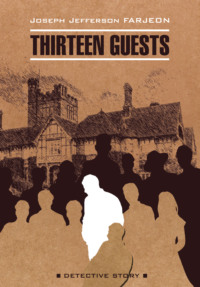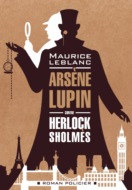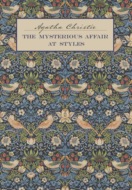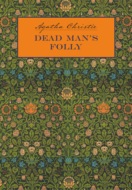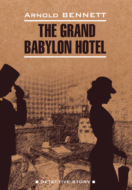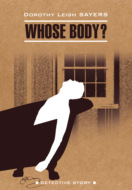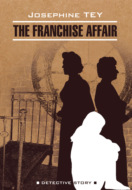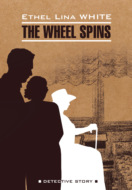Kitabı oku: «Тринадцать гостей / Thirteen Guests», sayfa 2
Chapter III. At the Black Stag
The brilliant amber of the day had gone. The sun had changed into a dull red disc and had dropped below the fringe of Greyshot Heath. Already the nip in the air had lost its pleasantness, and the sly old fox at Mile Bottom was opening its eyes in its earthy den to ponder on pheasants and mice and rabbits. One day the sly old fox would itself be hunted, and only for this reason had it escaped sharing the excommunication of the pole-cat. It was too good a runner to waste its agility in the north.
In a little wood half a mile from Bragley Court a cock pheasant fluttered heavily to his roosting place. He had no fear. Death, that odd, incomprehensible thing, came to others; but he had survived a dozen shoots, and he knew how to evade its shadow. If a stoat or a cat prowled too close, an old bird could easily raise the alarm and find some other retreat. Like all living things, the cock pheasant was immortal to himself, because he had not yet endured the experience of extinction. When extinction came, he would not know it.
The doctor’s brass plate had ceased to glow. It was now merely a cold flatness surrounded by vines. The sentinel dog outside the Cricketers’ Arms had risen, shaken itself, and gone inside. A lamp had appeared in the uncurtained window of the Black Stag overlooking Flensham station, and the gravelly railway station itself was a length of grey shadows broken by the occasional dim lights of platform lamps and of an inadequate waiting-room. Somewhere to the south loomed a large black hole that was a tunnel. You were conscious of the hole, but you could no longer see it, for its blackness had merged into the blackness of the hill through which it bored and of the sky above the hill.
A man sat at the uncurtained window of the Black Stag, staring with moody eyes at the deserted smudge of platform. He had arrived that morning on the 12.10. He had partaken of an unpalatable lunch, and had spent the early afternoon strolling about in a purposeless way, smoking incessantly, and almost as incessantly consulting his watch. He had returned to the inn at three o’clock, and had sat at the window till the 3.28 had drawn in. He had watched the two passengers alight, and had witnessed the accident. It had not interested him particularly, because his interest was centred in one thing, and one thing only; every event outside that one thing, every circumstance that bore no direct relation to it, was as unreal and shadowy as the platform at which he now stared. Had the man who had tumbled been seriously hurt? It did not matter. What was the lady doing? It did not matter. The scene was being enacted within a short distance of him, but for all the effect it produced upon his emotions it might have occurred in Siam. When it was over, and the train had gone, and the platform had become once more deserted, he had taken another purposeless stroll, again smoking incessantly, again incessantly consulting his watch. And now he was back again, and a large, heavily-breathing woman had brought in a lamp.
“You’ll be wanting tea?” asked the woman.
He was a rum one, this one was, but even rum ones took tea.
“The next train’s 5.56, isn’t it?” replied the man.
She told him that it was. She had told him the same thing three times already. Then she repeated her question about tea.
“Eh? Yes, I’ll have some tea,” he replied, without interest.
“What would you like with it? Just bread and butter? Or we’ve got some nice seed cake.”
“Anything. Yes. Whatever you’ve got.”
The woman evaporated, and appeared ten minutes later with a tray. She placed the tray on a sideboard, covered a stained table with a scarcely less stained cloth, and moved the tray to the table. The seed cake presided with dejected majesty on a tall, glass-pedestaled dish. Its mission appeared to be to make thick slices of bread and butter look appetising by comparison.
“Excuse me, sir,” said the woman, lingering. “But will you be staying the night?”
“What?” replied the man.
“Will you be staying the night?” repeated the woman. “If so, I could have your bag taken up—”
“Don’t touch my bag!” cried the man, interested at last. (“You’d have thought some one had trod on his toe,” the woman recounted later.) Then the man added: “I’m not sure. Yes, perhaps. I’ll let you know presently.”
The bag, a black one, was on a chair. When the woman had gone, the man went to it, opened it, looked inside, closed it, locked it, and moved it, for no reason that he could have explained, to another chair. Then he returned to the table and began his tea.
From the bar across the passage came suddenly the sound of raucous music. Some one had put a penny in a grotesque piece of machinery, and was receiving his money’s worth. The man plugged his ears with his fingers and glared at his teacup while the music ground on. After a minute he removed his fingers, then hastily shoved them back again. His forehead throbbed. His head seemed on the point of bursting. A poor man’s pleasure was filling his heart with hate.
“God above!” he shouted.
But nobody heard him. The music across the passage was even louder.
When at last the music ended, he found himself laughing. He did not remember beginning to laugh. He stopped abruptly.
“This won’t do,” he muttered. “This won’t do.”
He finished his tea quietly and returned to the window.
Chapter IV. Over the Yellow Cups
The teacups at the Black Stag were thick and white. At Bragley Court they were thin and yellow, and they began their clinking in the drawing-room, a long, lofty room of pink and cream, and then followed the guests to their various locations. If you disliked pink and cream and a preponderance of elderly feminine society, you stayed away from the official headquarters, confident that the yellow cups would find out where you were and come to you. Mohammed, at Bragley Court, would not have been put to the trouble of going to his mountain.
John’s cup came to him at exactly five o’clock, on a brightly-polished mahogany tray. It was brought and deposited on a small, low table by the pretty maid, and John watched her with interest to discover whether she still bore any traces of her recent agitation. Outwardly, she was now quite calm again, and because of her pleasant friendly quality he hoped that her appearance reflected the truth.
“Is your foot better, sir?” she asked.
“I am sure this interest is unconstitutional,” thought John, “but it’s nice.” So he did not discourage it. He told her that his foot was very much better. The lie did not impress itself on him at the moment.
A cushion had fallen to the ground. The maid picked it up and fixed it behind his head with a bright smile. Then she put another log on the crackling fire and departed.
It was a small, trivial incident, but later on, among a collection of incidents less trivial, John remembered it.
He was staring at the fire, watching the flames crackle upwards towards the chimney, when a voice said:
“Well, how are you getting along? Do you want some one to pour out your tea?”
He did not have to turn his head. Even if he had not recognised Nadine’s voice he would have sensed her personality in the faint silky rustle of her approach and the less faint aroma of expensive perfume. She disturbed the air as she drew near, breaking it up into little emotional ripples.
“Hallo,” he answered. “I’m all right. And thank you.”
“I could have my tea here with you,” she suggested, having already made up her mind not to have it anywhere else. “Shall I?”
“I’d love it,” replied John. “Only I feel I’m upsetting things terribly. You ought to be with the other guests, oughtn’t you?”
“Why? There are no oughts here. We do as we like. Haven’t you noticed it?”
“I’ve noticed they don’t worry you much.”
“Of course you have. The house is run on lines of the most highly-organised freedom. You may flirt desperately or read the Encyclopædia Britannica. Just follow your mood. No one will interfere with you, or display any vulgar curiosity. Even a man with a bad foot isn’t pestered with attention. But you can be quite sure the name of Foss has been looked up in Debrett.” He laughed. “Is it to be found there?”
“I’ve an uncle who fills a dozen dry lines.”
“Lord Aveling won’t find the lines dry!” smiled Nadine, sitting on the low stool lately occupied by Harold Taverley. For the first time he took in her rather daring tea-gown, with its provocative glimpses. It was a compliment that she should waste all this wealth of subtle femininity on him. Or was she wasting it? “Debrett and the old school tie will chain you here for the week-end, however your foot progresses! Lord Aveling can’t run a country—though he wishes he could—but he can run a country house, and he lives for these house-parties, you know. The little thrill of them—the little notoriety of them—the little excitement of them—and the little things that happen in them. And, sometimes, quite big things.”
A desire swept through John to ask, “And what do you live for?” But he quelled the impulse, and asked instead:
“Are any big things going to happen this week-end?”
She regarded him quizzically for a few moments, then replied, “I shouldn’t wonder.”
She turned and nodded to the pretty maid, who had reappeared with another highly-polished little tray gleaming with yellow china. The second tray was deposited beside the first tray. As the maid departed, Nadine’s eyes followed her.
“Pretty, isn’t she?” said Nadine.
“Very,” answered John.
Two people came down the staircase. Harold Taverley and Anne. The signs of the road were no longer upon them, and both had changed to indoor clothes, but John noticed that Anne still favoured green. She was wearing a rather severe, close-cut frock that indicated without exploiting her slim boyish figure. Her dark hair was neat and smooth, and slightly waved. John gained an odd impression as she ran forward to greet Nadine that, while conceding to the moment, her real spirit was elsewhere.
“Nice to see you again, Nadine,” she exclaimed. “Wasn’t the last time Cannes?”
“Yes—drinking coffee at the Galerie Fleuries,” answered Nadine. “Did you have a good run?”
“Wonderful! You must try my new mare. She goes over everything.”
“I’d love to. But you’ll want her to-morrow?”
“Please! You can have Jill, though. We’ve still got her, and you always liked her, didn’t you?” She turned to John. “Do you ride? How’s your foot? Or are you sick of being asked? I’d be!”
“It’s the penalty of being a pampered invalid,” replied John; “and I don’t mind it at all. My foot’s fine, thank you. But I’m afraid it wouldn’t be well enough to join you to-morrow.”
“Beastly shame,” said Anne. “Never mind, we’ll fix you up with jig-saw puzzles. Let me know if I can do anything, won’t you? See you later, Nadine. Come along, Harold.”
Taverley smiled at John.
“We’d stay, but you’re being looked after,” he remarked. “Be good to him, Nadine.”
When they were alone again, Nadine frowned.
“Beastly man, that Mr. Taverley,” she observed. “He’s so hatefully nice!”
“I like him, too,” replied John. “Is niceness a vice?”
“Yes—like water. You must have something with it.”
“I imagine he’s got a lot with it.”
“Rather. All the virtues, and a perfect off-drive. And he hates me!”
“Oh, no, he doesn’t!”
“How do you know that?”
John coloured at the quick question, and at his clumsiness. He decided not to retreat.
“We talked of you,” he said. “Do you mind?”
She glanced in his cup, noted it was empty, and filled it.
“Of course I don’t mind,” she answered. “What else do people talk about but other people? But don’t tell me what Mr. Taverley said about me. Whatever it was, I am quite sure he forgave me, and so I’d have to forgive him, the beast!”
An interruption occurred. A uniformed nurse—Bragley Court could even materialise that—appeared abruptly and insisted on an application of surgical spirit. Surgical spirit during tea! But the nurse explained apologetically that she had a few minutes now, and might not have later.
“Does she look after Mrs. Morris?” queried John, when the nurse had soaked his foot and gone.
“Yes,” answered Nadine. “Poor old lady. She ought to be dead.”
“You mean—the release?”
“Of course! What’s the use? You shoot a horse or a dog when it’s incurable, but God wants humans to go on suffering!” She shuddered, and for once in her life misinterpreted the expression of a man who was dwelling on the movement of her body. “Oh, don’t think I can’t face pain,” she added almost defiantly. “But I don’t care for it. That’s why I grasp life while it’s here!”
She had spoken impulsively, almost as though thinking aloud. Her hand brushed his. She rose and walked to a window, drawing the long curtain slightly aside to look out into the gloaming. But all she saw was her own reflection and the provocative gown gleaming back at her through the glass.
John watched her, waiting for her to come back. Why was she so long about it? Why was he waiting with such an intense desire for her to turn? A sudden panic seized him.
“Nonsense!” he thought, aghast.
That morning, blind with grief and saturated with its egotism, he had flung some things into a bag and had fled from London. An unexpected letter had toppled his small world over. It had come with the surprising unexpectedness of a poisoned arrow. It had contained poison, too—poison that had polluted the very springs of his faith. And in the first pangs of his agony he had headed for a station—any station—and had taken a ticket to a distant place—any place—so that he might escape the grotesque irony of immediate obligations. Any place would do, so long as it was an unfamiliar place, a place without associations. Somebody ahead of him in the ticket office had said, “Flensham.” So he had said, “Flensham.”
And this was where the somebody had unconsciously led him—to her own reflection standing out vividly and tormentingly in the darkness of a window!
“Nonsense—nonsense!” he repeated in his thoughts. “I’m just in a mess. This is reaction. It doesn’t mean anything. Reaction, and my foot. Lord, how it’s hurting!”
He concentrated on the pain, trying to trick himself. He rejoiced in its re-discovery, and saddled it with responsibility for his condition. Pain played the deuce with any one. It temporarily distorted values, and gave fictitious significance to unimportant things. That was why patients in hospitals so often fell in love with their nurses....
Nadine came back to him as abruptly as she had left him.
“What are you going to do?” she asked. “Stay here?” He stared at her. Her tone was almost harsh. “I mean—well, you’ve spoken so little about yourself, haven’t you? Aren’t you expected somewhere to-night?”
He shook his head.
“Where were you going when I met you at the station?”
“Didn’t you ask that? Anywhere.”
“That sounds morbid!”
“Don’t judge by the sound. I’m fond of roaming.”
“I see. And you roamed—here.”
“Yes.” He had a sense that they were going round and round in a circle, and he tried to smash his way out. “You know, I don’t think my foot’s half as bad as it seems.” Yet a moment ago he had been insisting on the pain of it. “I believe I could get away all right.”
“You think the foot could stand it?”
“I think so.”
“But the question still remains—where do you want to get away to?”
They were moving back into the circle again. He became exasperated.
“Yes, and that’s my question,” he retorted.
“Sorry,” she said.
He was appalled at himself. He had not intended to betray his exasperation. He was not exasperated any longer. He did not understand how he ever had been.
“No, I’m sorry,” he muttered. “Really, you must forgive me. You’ve been terribly kind. I don’t know what’s the matter with me.”
Nadine knew. It was her knowledge that had sent her to the window, and that had produced her rather lame effort to readjust the trouble. Something had happened very suddenly. She had sensed the exact moment. It was not the first time the moment had occurred in her experience.
Well—could it be helped? And did it matter? She thought of old Mrs. Morris upstairs. One day she might be like that! She thought of the hunt on the morrow, and of the hunted creature doomed to die, as every one at Bragley Court was doomed to die! But at this moment the hunted creature was not conscious of its fate, nor was any one at Bragley Court, saving Nadine Leveridge herself. She was always conscious of it, and of life’s demand for compensation.
“Don’t apologise, Mr. Foss, and don’t worry,” she said. “It will be all the same five hundred years hence. Meanwhile, since it’s obvious you can’t move, and would have nowhere particular to move to even if you could, remember that we are two very small dots in a very large universe, and finish your tea.”
Chapter V. The 5.56
The 3.28 had brought two visitors to Bragley Court. The 5.56 brought four. The man at the window of the Black Stag watched them alight.
The 5.56 shared with the 12.10 the distinction of being a fast express, and was, therefore, favoured by the majority of Lord Aveling’s guests. It was pleasant to arrive by the 12.10 in the morning, when the sun was at its highest and the sky was at its brightest; you reached your room at Bragley Court by half-past twelve, and your bag was unpacked and your brushes were out by the time the luncheon-gong sounded at half-past one. The 3.38 had its points, too, despite a tedious change, for there is always rather a jolly feeling when you arrive at a country house at tea-time. Tea is an occasion to look forward to after the dust and grit of travel; you flop into soft things and regain your belief in the harmony of life’s rhythm.
But the 5.56 was the train-de-luxe. You could pass a reasonable portion of the day in London before catching it. You spent the minimum of time in it, and although you missed the yellow cups of Bragley Court, a smiling attendant brought you blue ones. And when, at 5.56 to the minute, the gravel sounded in your ears and the train slackened speed, you found Flensham station at its peak—the station-master at his most dignified, the porter at his most obliging, and Old Jim (who never troubled to meet the 3.28, his horse, like himself, being a veteran and needing afternoon rest) at his most hopeful. Not that Old Jim ever expected to get a fare to Bragley Court. His horseflesh was not of the Bragley breed, and Lord Aveling supplied cars for all his guests who did not bring their own. Still there were other destinations, and sometimes a passenger on the 5.56 was bound for one of them.
Of the four guests deposited on the platform on this particular evening, the last to enter the waiting Rolls was a tall, slightish man mid-way between thirty and forty. His name was Lionel Bultin, and he stood, silent and aloof, and purposely lingering, to watch a little incident.
His three companions were, as he had established in the restaurant car, Zena Wilding, the actress, and a married couple who lived an unenviable existence under the name of Chater. Bultin, a ruthless reader of character, had needed only two minutes to decide that an additional “e” slipped between the second and third letters of their name would have described the Chaters more accurately. When the husband looked straight at you he seemed to be seeing you round a corner. The wife hardly ever looked straight at you. She was a silent creature whose moroseness appeared to form her protection against a perpetual desire to scream.
Zena Wilding, on the other hand, was lively and talkative, and while she worried vivaciously about her luggage, she never missed an opportunity to advertise her dentist. Later on, the solemn station-master paused in the important business of writing “We could do—” to recollect her dazzling teeth before concluding “—with new fire-buckets.” And the porter actually dreamt of the teeth, earnestly filling a freight train with tooth-paste to keep them white. But the dazzling teeth made no impression on Lionel Bultin, saving as possible matter for a theatrical paragraph. He felt no personal emotion about them. He had done with personal emotion ten years ago....
In order to understand Bultin’s attitude, and the detachment with which his trained intelligence now absorbed an incident frightful with suppressed emotion, it is necessary to travel back those ten years to the day when, an eager and unsuccessful young journalist, he came to his great decision. In a not-very-attractive bed-sitting-room he had faced his mirror frankly, and had said:
“You’re making a hash of things. Why is it?”
Yes, why was it? Why did people pay no attention to him? Why had an editor refused, for the third time, to see him that very day? Did eagerness and tenacity count for nothing? Willingness—obligingness—sensitiveness? Bultin possessed all these qualities, plus an average capacity to string words together. So why was he living in this faded bed-sitting-room? Why could he not go across to the restaurant opposite and order a wing of chicken? Why was he hungry?
And then, suddenly, his reflection had changed. The despair and the eagerness had left it. Something quite new had entered and, because he was intelligent as well as hungry, he studied it. The new thing was a queer, cold callousness. A callousness that, because it had lost its faith in humanity, was independent of humanity. He felt as though, all at once, his sensitive soul had died, giving a new functioning power to what remained.
“This means success or the river,” he thought soberly.
He put on his hat and he went out, undecided. The river lay on his right, and the office of the inaccessible editor on his left. He turned to the left. The commissionaire whom he had interviewed thrice saw him coming, and exclaimed, “Can’t you take ‘No’ for an answer?”
Bultin wrote something on a slip of paper. “Give that to your fool of an editor,” he said, and left the office. He had written on the paper: “I could have given you a signed article by Bernard Shaw. Now you can sing for it. The above address will find me.”
Next day the signed article appeared in a rival paper. The editor, a weak man who spent his life in fear of a dropping circulation, never learned that Bultin had not supplied the rival paper with the article. Two hours before Bultin had scribbled his rude note, a friend of his had sold it elsewhere. The editor sent for Bultin and offered him a commission. Bultin turned it down.
He managed to borrow fifty pounds. He began a life of curious isolation. He was ever present in journalistic and social circles, but he remained aloof in his attitude. His manner indicated personal circumstances that did not exist. You would have thought, if you had met Lionel Bultin during those weeks, that he had suddenly come into a large fortune, although he showed no generosity in spending it, and that he could now snap his fingers at life. A successful man attracts success.
Whether Bultin would have achieved his purpose without the assistance of a small social column is not certain. This column was the last remnant of his evaporating work at the time of his decision, and it was itself on the verge of evaporation. Now, however, it began to wake up. It ceased to be soft and kindly. Amazing bits about amazing people appeared in it. Startling bits. Rude bits. With still a few complimentary bits, as bait. All signed Bultin.
“What does Bultin say?” people started asking.
An actress in the Savoy grill-room—yes, Bultin now went there—left her table to tell him of a pearl necklace she had lost. Two or three weeks earlier he would have travelled five miles to the actress. Now she had travelled five yards to him. Twice the alleged value of the necklace was given exclusively in his column next day, with an account of how the actress had left her pâté de fois gras to tell him of the loss. It had really been tomato soup, and the necklace had never been lost at all; but such minor matters were unimportant. The important matter was that the concluding sentence of Bultin’s paragraph was nearly, but not quite, libellous.
Bultin’s column grew to two. Then to a full page. In a short while the fifty pounds was repaid. Bultin had killed himself, and never had a moment’s financial anxiety afterwards. His carcass grew rich....
And, just as the actress in the Savoy grill-room had angled for his publicity, so Zena Wilding posed for him now on Flensham platform, striving to create a paragraph out of her luggage, her Paris hat, and her teeth.
“Oh, dear! Am I keeping everybody waiting?” she gushed, as Mr. and Mrs. Chater moved towards the car.
“Yes,” answered Bultin. (His column should mention later how he had agreed with her.)
Then Zena forgot all about her luggage and her hat and her teeth. She also forgot Bultin. The man who had waited for hours in the Black Stag was standing before her.
She gave a gasp. For an instant she looked almost old. She stared at the man without moving, but Bultin gained an impression that she was arching her back like a cat. Then she turned swiftly, and dived towards the car. Mrs. Chater was just getting in.
“Is anything the matter?” inquired Mrs. Chater, apathetically.
“No, nothing!” cried Zena. “Which corner would you like?”
Mr. Chater turned, and saw the man. He also stared. But his manner was considerably more composed than Zena’s. His expression of surprise changed to a smile, and he walked up to the man. The man had an unlit cigarette in his mouth.
“Want a light?” inquired Mr. Chater.
The man looked livid. Mr. Chater struck a match. The man blew it out.
“See you presently,” he muttered.
“I wouldn’t,” answered Mr. Chater quietly.
Two seconds later, Mr. Chater was entering the car.
About to follow, Bultin changed his mind and strolled casually up to the man.
“You might as well,” he remarked, taking out his lighter. “You’re supposed to burn one end, you know.”
The man switched round violently. Ten years previously Bultin would have dreamt of the expression in the man’s eyes. Now he merely found it undoubtedly interesting.
“I am Lionel Bultin,” he said. “I am spending the week-end at Bragley Court. I shall be there till Monday morning. I pay for material—provided, of course, that I use it.”
For the second time that evening, the man escaped a brainstorm by the breadth of a hair. The first time it had nearly been caused by a penn’orth of mechanical music.
“Bragley Court,” he repeated, suddenly calm. “You’re going there, too, eh?” He bent forward and accepted the light. As he withdrew his head he added, “You’ll get something to write about.”
